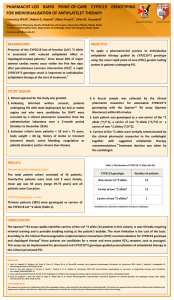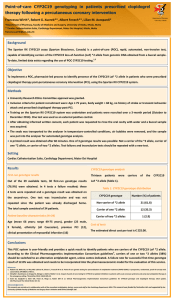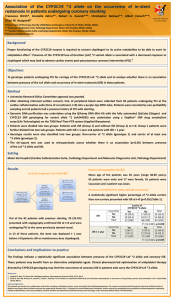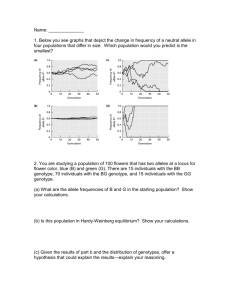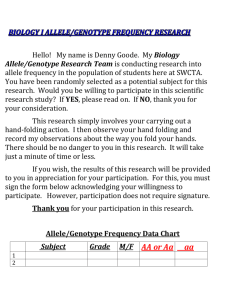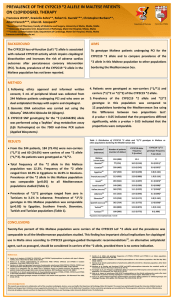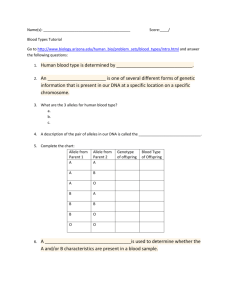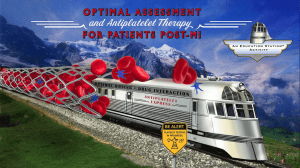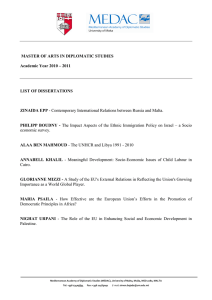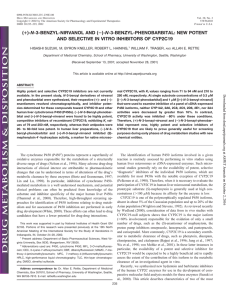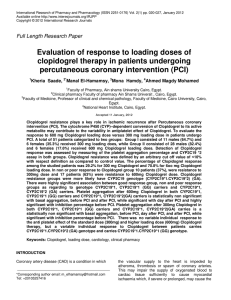Pharmacist-led CYP2C19 genotyping in patients ... following percutaneous coronary intervention
advertisement
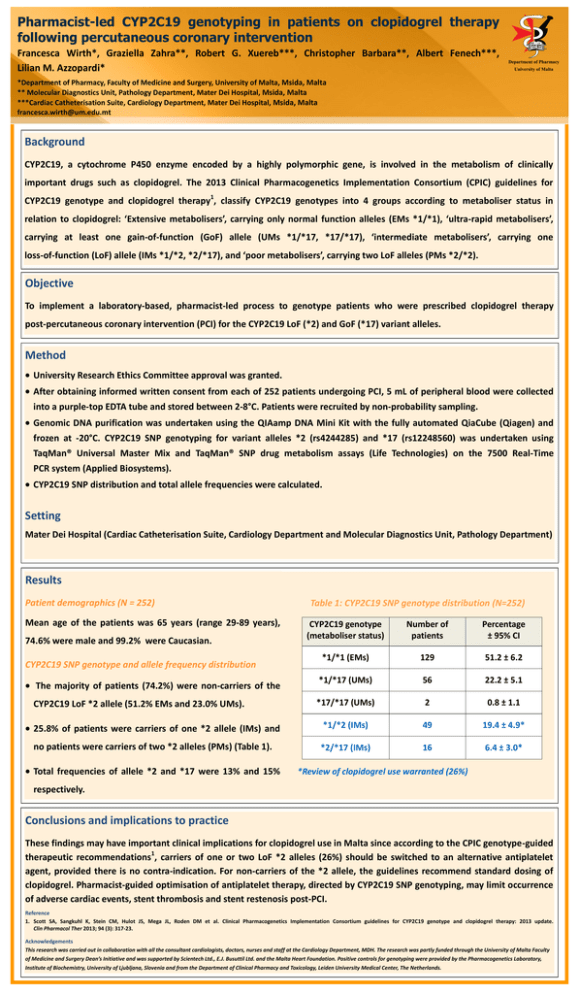
DEPARTMENT OF PHARM ACY UNIVERSI TY OF MA LTA Pharmacist-led CYP2C19 genotyping in patients on clopidogrel therapy following percutaneous coronary intervention Francesca Wirth*, Graziella Zahra**, Robert G. Xuereb***, Christopher Barbara**, Albert Fenech***, Lilian M. Azzopardi* Department of Pharmacy University of Malta *Department of Pharmacy, Faculty of Medicine and Surgery, University of Malta, Msida, Malta ** Molecular Diagnostics Unit, Pathology Department, Mater Dei Hospital, Msida, Malta ***Cardiac Catheterisation Suite, Cardiology Department, Mater Dei Hospital, Msida, Malta francesca.wirth@um.edu.mt Background CYP2C19, a cytochrome P450 enzyme encoded by a highly polymorphic gene, is involved in the metabolism of clinically important drugs such as clopidogrel. The 2013 Clinical Pharmacogenetics Implementation Consortium (CPIC) guidelines for 1 CYP2C19 genotype and clopidogrel therapy , classify CYP2C19 genotypes into 4 groups according to metaboliser status in relation to clopidogrel: ‘Extensive metabolisers’, carrying only normal function alleles (EMs *1/*1), ‘ultra-rapid metabolisers’, carrying at least one gain-of-function (GoF) allele (UMs *1/*17, *17/*17), ‘intermediate metabolisers’, carrying one loss-of-function (LoF) allele (IMs *1/*2, *2/*17), and ‘poor metabolisers’, carrying two LoF alleles (PMs *2/*2). Objective To implement a laboratory-based, pharmacist-led process to genotype patients who were prescribed clopidogrel therapy post-percutaneous coronary intervention (PCI) for the CYP2C19 LoF (*2) and GoF (*17) variant alleles. Method University Research Ethics Committee approval was granted. After obtaining informed written consent from each of 252 patients undergoing PCI, 5 mL of peripheral blood were collected into a purple-top EDTA tube and stored between 2-8°C. Patients were recruited by non-probability sampling. Genomic DNA purification was undertaken using the QIAamp DNA Mini Kit with the fully automated QiaCube (Qiagen) and frozen at -20°C. CYP2C19 SNP genotyping for variant alleles *2 (rs4244285) and *17 (rs12248560) was undertaken using TaqMan® Universal Master Mix and TaqMan® SNP drug metabolism assays (Life Technologies) on the 7500 Real-Time PCR system (Applied Biosystems). CYP2C19 SNP distribution and total allele frequencies were calculated. Setting Mater Dei Hospital (Cardiac Catheterisation Suite, Cardiology Department and Molecular Diagnostics Unit, Pathology Department) Results Patient demographics (N = 252) Mean age of the patients was 65 years (range 29-89 years), Table 1: CYP2C19 SNP genotype distribution (N=252) CYP2C19 genotype (metaboliser status) Number of patients Percentage ± 95% CI *1/*1 (EMs) 129 51.2 ± 6.2 *1/*17 (UMs) 56 22.2 ± 5.1 *17/*17 (UMs) 2 0.8 ± 1.1 25.8% of patients were carriers of one *2 allele (IMs) and *1/*2 (IMs) 49 19.4 ± 4.9* no patients were carriers of two *2 alleles (PMs) (Table 1). *2/*17 (IMs) 16 6.4 ± 3.0* 74.6% were male and 99.2% were Caucasian. CYP2C19 SNP genotype and allele frequency distribution The majority of patients (74.2%) were non-carriers of the CYP2C19 LoF *2 allele (51.2% EMs and 23.0% UMs). Total frequencies of allele *2 and *17 were 13% and 15% *Review of clopidogrel use warranted (26%) respectively. Conclusions and implications to practice These findings may have important clinical implications for clopidogrel use in Malta since according to the CPIC genotype-guided 1 therapeutic recommendations , carriers of one or two LoF *2 alleles (26%) should be switched to an alternative antiplatelet agent, provided there is no contra-indication. For non-carriers of the *2 allele, the guidelines recommend standard dosing of clopidogrel. Pharmacist-guided optimisation of antiplatelet therapy, directed by CYP2C19 SNP genotyping, may limit occurrence of adverse cardiac events, stent thrombosis and stent restenosis post-PCI. Reference 1. Scott SA, Sangkuhl K, Stein CM, Hulot JS, Mega JL, Roden DM et al. Clinical Pharmacogenetics Implementation Consortium guidelines for CYP2C19 genotype and clopidogrel therapy: 2013 update. Clin Pharmacol Ther 2013; 94 (3): 317-23. Acknowledgements This research was carried out in collaboration with all the consultant cardiologists, doctors, nurses and staff at the Cardiology Department, MDH. The research was partly funded through the University of Malta Faculty of Medicine and Surgery Dean’s Initiative and was supported by Scientech Ltd., E.J. Busuttil Ltd. and the Malta Heart Foundation. Positive controls for genotyping were provided by the Pharmacogenetics Laboratory, Institute of Biochemistry, University of Ljubljana, Slovenia and from the Department of Clinical Pharmacy and Toxicology, Leiden University Medical Center, The Netherlands.
